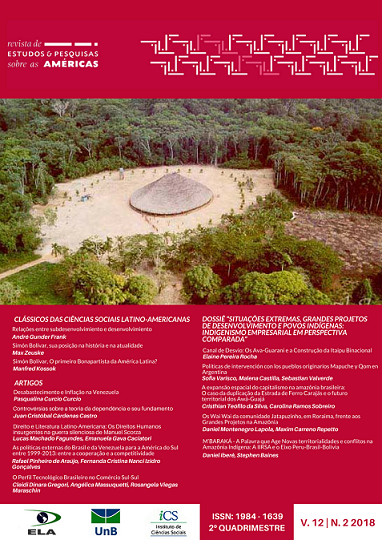A Expansão Espacial do Capitalismo na Amazônia Brasileira: O caso da duplicação da Estrada de Ferro Carajás e o futuro territorial dos Awá-Guajá
Keywords:
Ciências Sociais; Antropologia; Etnologia IndígenaAbstract
Este artigo parte do pressuposto de que o capitalismo se constitui como uma potente força colonizadora, extrapolando constrangimentos nacionais ou “internos” para seu desenvolvimento e corrompendo mecanismos ou instrumentos legais e institucionais para sua contenção. Será analisado o caso de duplicação da Estrada de Ferro Carajás através da documentação de licenciamento ambiental disponível na Fundação Nacional do Índio. Espera-se demonstrar como são utilizados artifícios retóricos para produzir a fragmentação do processo e viabilizar o empreendimento com efeitos lesivos e irreversíveis para os povos indígenas, afetando suas perspectivas de sobrevivência e reduzindo sua autonomia política a uma relação clientelística com a empresa.
Palavras-chave: Povos Indígenas Isolados, Política Indigenista, Estrada de Ferro Carajás, Awá-Guajá
The Spatial Expansion of Capitalism in the Brazilian Amazon: The case of the duplication of the Carajás Railroad and the territorial future of the Awá-Guajá
Abstract
This article starts from the assumption that capitalism is constituted as a powerful colonizing force, extrapolating national or "internal" limitations for its development and corrupting legal and institutional mechanisms for its containment. The case of the duplication of the Carajás Railroad will be analyzed through the documentation of environmental licensing available in the Indian National Foundation of Brazil. We wish to demonstrate how rhetorical artifices are used to produce the fragmentation of the process and consequently to render the duplication of the railroad and its effects possible. This fragmentation is responsible for irreversible damages to the territory of Indigenous Peoples, affecting their prospects of survival and reducing their political autonomy to a clientelistic relationship with the company.
Keywords: Isolated Indigenous Peoples, Ethnic Politics, Carajás Railway, Awa-Guaja
La Expansión Espacial del Capitalismo en la Amazonia Brasileña: El caso de la duplicación del Ferrocarril Carajás y el futuro territorial de los Awá-Guajá
Resumen
Este artículo parte del supuesto de que el capitalismo se constituye como una potente fuerza colonizadora, extrapolando las limitaciones nacionales o "internas" para su desarrollo y corrompiendo mecanismos o instrumentos legales e institucionales para su contención. Se analizará el caso de duplicación del Ferrocarril Carajás a través de la documentación de licenciamiento ambiental disponible en la Fundación Nacional del Indio. Se espera demostrar cómo se utilizan artificios retóricos para producir la fragmentación del proceso y viabilizar el emprendimiento con efectos perjudiciales e irreversibles para los pueblos indígenas, afectando sus perspectivas de supervivencia y reduciendo su autonomía política a una relación clientelística con la empresa.
Palabras clave: Pueblos indígenas aislados, Política étnica, Carretera de Hierro Carajás, Awa-Guajá
Downloads
Downloads
Published
How to Cite
Issue
Section
License
The published material is the property of the Journal, and may be reproduced in whole or in part with indication of the source.
Copyright: Authors will be responsible for obtaining the copyright of the material used. Authors who publish in this journal agree to the following terms:
a)Authors retain the copyright and grant the journal the right of first publication, with the work simultaneously licensed under
the Creative Commons Attribution License which allows the sharing of work with acknowledgment of authorship and initial publication in this journal.
b) Authors are authorized to take additional contracts separately, for non-exclusive distribution of the version of the work published in this journal (eg, publish in institutional repository or as a book chapter), with acknowledgment of authorship and initial publication in this journal.
c) Authors are allowed and encouraged to publish and distribute their work online (eg in institutional repositories or on their personal page) at any point before or during the editorial process, as this can generate productive changes as well as increase the impact and the citation of the published work (See The Effect of Free Access).
















